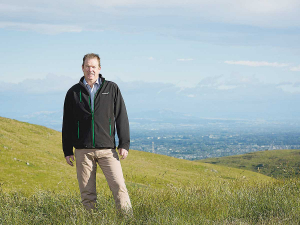Ravensdown partners with Footrot Flats to celebrate Kiwi farming heritage
Ravensdown has announced a collaboration with Kiwi icon, Footrot Flats in an effort to bring humour, heart, and connection to the forefront of the farming sector.
 Departing Ravensdown chief executive Greg Campbell says it's time to hand over the reins to someone with new ideas.
Departing Ravensdown chief executive Greg Campbell says it's time to hand over the reins to someone with new ideas.
Departing Ravensdown chief executive Greg Campbell says his first year at the fertiliser co-op was the toughest.
He took over in 2012, when the farmer-owned fertiliser co-op has - for the first time - paid no rebate to shareholders, carried a high level of debt and reported poor profit.
Campbell remembers having to front up to the board with his plan to revitalise the business. He says the board was "bold" and backed his plan.
"I also remember having to roll out the plan...having some tough discussions with our shareholders around what we were planning to do," he told Dairy News/
"Across the business there was overwhelming support for the plan and we delivered on that promise."
Campbell started his six-month notice period in December last year. After serving eight years at Ravensdown, part of a 25-year stint in chief executive roles he says the time is right to step down.
"I'm not leaving through being dissatisfied. I think it's time to hand over the reins to someone with new ideas."
Campbell attributes the achievements at Ravensdown during the past eight years to a team effort by staff, leadership, board members and farmer shareholders.
"We have accomplished some good things together," he says.
In the early years, he was instrumental in the co-operative exiting Australia, focusing on the financial fundamentals and bcoming even more science-led.
Campbell initiated the setting up of what was to become the largest farm environmental consultancy in New Zealand. This was done in anticipation of possible regulations and also in response to shareholder feedback that farmers needed to help mitigating their impacts - not just growing as much as possible.
His consistent message, over the years, is that the farm-erowned co-operative needed to be selling the right amount of fertiliser, not the most.
Campbell has encouraged greater nutrient use efficiency so that the expense and potential environmental impact of essential nutrients were optimised.
The ClearTech effluent management system, which he believes has the potential to transform a dairy farm's greshwater use, was launched in 2018.
The purpose of Ravensdown's business changed under his watch - moving from providing essential impact at lower cost - to enabling smarter farming for a bettr New Zealand.
Campbell believes his legacy is leading the co-operative's transformation from a predominantly "fert company" to being seen as the "farm nutrient and environmental experts".
Campbell's legacy
Global trade has been thrown into another bout of uncertainty following the overnight ruling by US Supreme Court, striking down President Donald Trump's decision to impose additional tariffs on trading partners.
Controls on the movement of fruit and vegetables in the Auckland suburb of Mt Roskill have been lifted.
Fonterra farmer shareholders and unit holders are in line for another payment in April.
Farmers are being encouraged to take a closer look at the refrigerants running inside their on-farm systems, as international and domestic pressure continues to build on high global warming potential (GWP) 400-series refrigerants.
As expected, Fonterra has lifted its 2025-26 forecast farmgate milk price mid-point to $9.50/kgMS.
Bovonic says a return on investment study has found its automated mastitis detection technology, QuadSense, is delivering financial, labour, and animal-health benefits on New Zealand dairy farms worth an estimated $29,547 per season.
OPINION: Staying with politics, with less than nine months to go before the general elections, there’s confusion in the Labour…
OPINION: Winston Peters' tirade against the free trade deal stitched with India may not be all political posturing by the…